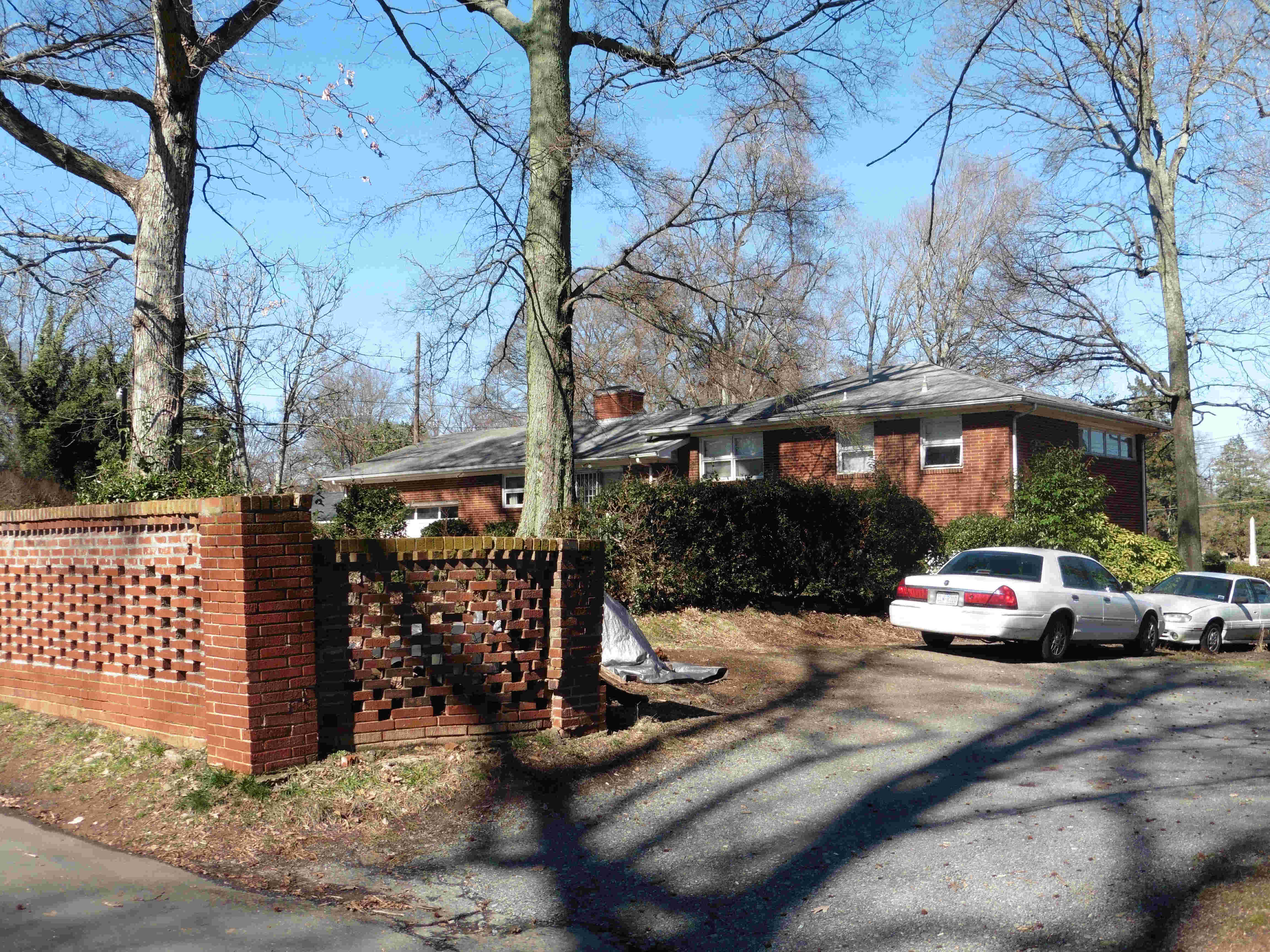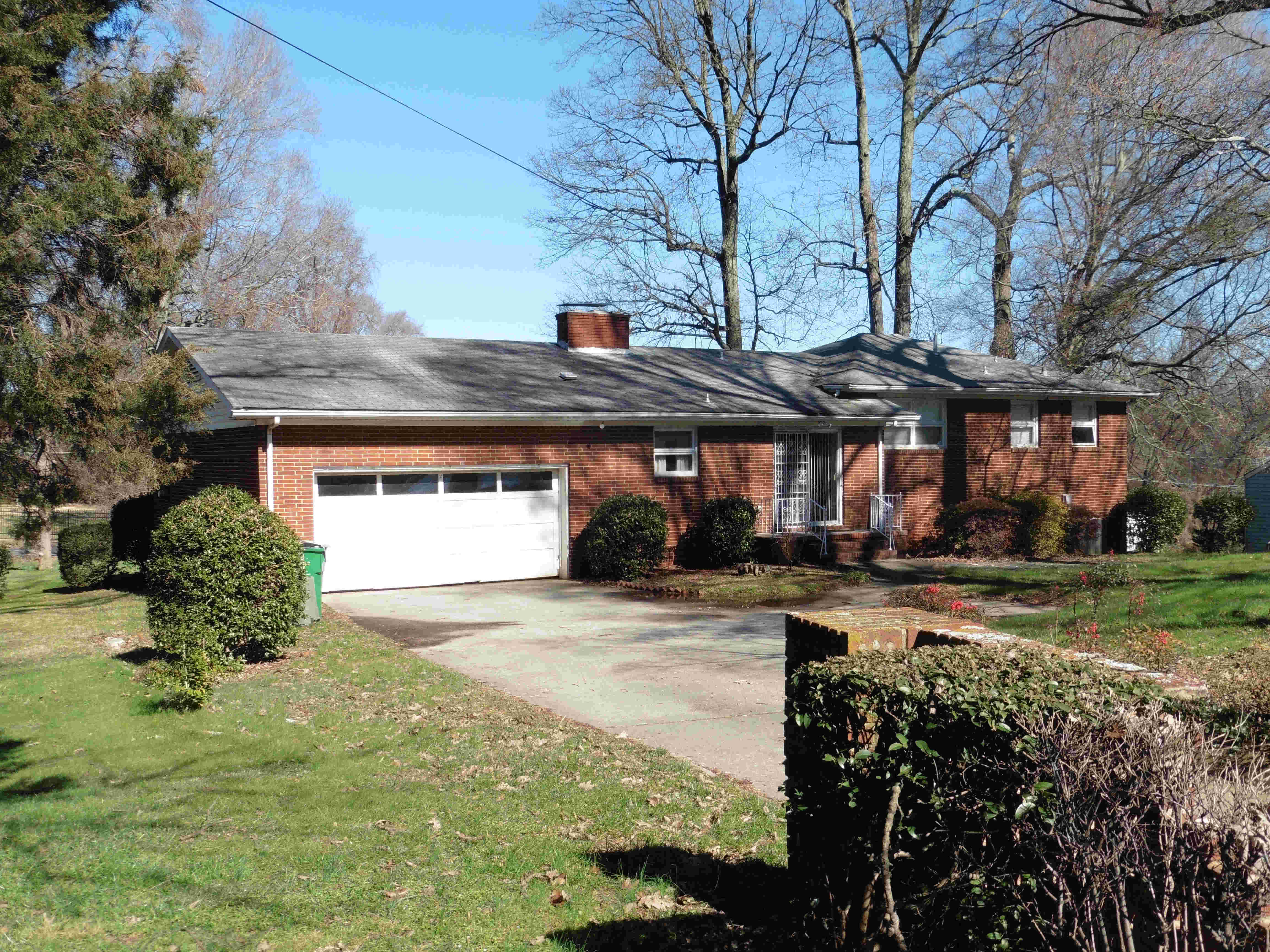1607 Oaklawn Avenue
 Built about 1958 for Jimmy and Minnie McKee, community leaders who were best known as proprietors of their Excelsior Club on Beatties Ford Road. They also played large roles in Charlotte’s cultural life, helping launch black-format WGIV radio in the late 1940s and 1950s, serving as lay leaders for what became First Baptist Church West in McCrorey Heights, and working tirelessly to raise funds for Johnson C. Smith University and other organizations.
Built about 1958 for Jimmy and Minnie McKee, community leaders who were best known as proprietors of their Excelsior Club on Beatties Ford Road. They also played large roles in Charlotte’s cultural life, helping launch black-format WGIV radio in the late 1940s and 1950s, serving as lay leaders for what became First Baptist Church West in McCrorey Heights, and working tirelessly to raise funds for Johnson C. Smith University and other organizations.
***
According to a biographical note in the McKee family papers at UNC Charlotte: “James Robert ‘Jimmie’ McKee was born in 1912 in Charlotte, N.C., to John and Violet Miller McKee. He was the second of ten children, but was orphaned by the time he was fourteen. At that point he left school to work and provide for his siblings. On January 13, 1939 he married Minnie Jackson McKee. One of the jobs that he had was head mail clerk with Horton Motor Lines. In addition, he tended bar at at some of the finest night clubs and country clubs in the Charlotte area. This experience gave him the idea of starting a club for African Americans in the Charlotte area, since blacks were barred from white establishments.”
In 1944, the McKees purchased a two story house at 921 Beatties Ford Road and set about making it into night club and meeting space. It became the Excelsior Club, with a striking Art Moderne exterior makeover completed in the early 1950s. The Excelsior hosted women’s club meetings, card parties, wedding galas, fund-raisers and dances. Around its U-shaped bar, African American activists met and strategized. Indeed when men such as Pete Cunningham and Charlie Dannelly won election to city council and later to statewide offices, they continued to hold informal “office hours” at the Excelsior Club bar.
The McKee family loved music. Minnie, who taught second grade at Double Oaks School, sang often at gatherings in Charlotte, especially at First Baptist Church, which stood at 1020 S. Church Street downtown before moving out to McCrorey Heights in the 1980s as First Baptist Church West. A 1948 Charlotte Observer article reported that Jimmy McKee would soon present a daylong Quartet Contest at Charlotte’s Armory Auditorium (predecessor of today’s Grady Cole Center), featuring twenty gospel singing groups from six southern states. “On the program of entertainment will be Lillie [also spelled Lilly] Rose McKee, graduate of Johnson C. Smith University who is studying at the Julliard School of Music in New York City.” A niece of Jimmy McKee, the young soprano had recently completed a national recital tour.
Not surprisingly, the Excelsior Club became a musical hotbed. Nat King Cole performed there on an early tour when he was known more as a jazz pianist and Civil Rights activist, not yet the television crooner he later became. A young man who hung around the Excelsior, Wilbert Harrison, developed into a national R & B artist best remembered for the first hit recording of the song “Kansas City.” When white station owner Frances Fitzgerald got the notion to make WGIV into Charlotte’s first all-black radio station, she turned to Jimmy McKee to help transform that vision into reality. WGIV’s star announcer, ‘Genial Gene’ Potts, learned his craft as master of ceremonies for community events at the Excelsior Club.
Mr. McKee made local Civil Rights history in other rhelms, as well. In 1948 the Charlotte Observer reported that he was launching “the first annual tri-state Negro golf tournament.” Mayor Herbert H. Baxter teed off the initial ball. Held at the private Meadowbrook Golf Course, it desegregated that facility — a very early Civil Rights victory that would inspire a lawsuit to desegregate the city’s public course at Revolution Park in the 1950s.
The McKees used their community connections to raise money for worthy causes from the NAACP to the YMCA to the Colored Police Association. At First Baptist Church West today, oil paintings of Jimmy and Minnie McKee acknowledge their role in establishing the McKee-Wilson Endowed Trust, an ongoing fund that contributed over $250,000 to youth work of the church. Outside of church, Jimmy McKee hosted a long-running “informal gathering of men who met to eat, sip and gab after Smith games,” noted JCSU’s Golden Bull yearbook. It grew into the 100 Club in 1967, a well-organized donor organization that amassed thousands of dollars for the University across the decades.
The McKee family had this house built about 1958, a year after the Charlotte Post newspaper honored Mr. McKee as “Sepia Man of the Year.” Jimmy and Minnie McKee lived here until their passing in the mid 1980s.



Architecture
Split-level; an early example of this Ranch-style variant in Charlotte. Red-brick with two-story hip-roofed bedroom block, gable-roofed one-story living/dining/garage block. At 2088 square feet with four bedrooms, two and a half baths, it is one of the larger dwellings in McCrorey Heights. It is located on a narrow lot, its back yard (including its automobile entrance) facing directly on Washington Avenue.
Building permits
First appeared in city directory
1959 – James R. McKee & Minnie J.
He: Excelsior Club. She: Teacher, Double Oaks School
Resources
“Marshall Sehorn,” biography on the Apple Music website. On-line at https://itunes.apple.com/us/artist/marshall-sehorn/28934216.
“Negro Quartet Contest Sunday,” Charlotte Observer, December 9, 1948.
“Negro Tri-State Links Meet Set,” Charlotte Observer, September 5, 1948.
William Huffman and Thomas Hanchett, “The Excelsior Club: Survey and Research Report,” Charlotte Mecklenburg Historic Landmarks Commission, 1985. On-line at: http://www.cmhpf.org/Properties%20Foundation%20Reports/excelsior.html
Resources
“‘Genial Gene’ Potts,” in Bill Carpenter, ed., Uncloudy Day: The Gospel Music Encyclopedia (Backbeat Books, 2005), p. 335.
“Jimmy McKee Collection 1944 – 1985” [finding guide], UNC Charlotte Special Collections.
“No Stammer! No Static! All’s Clear When Gene Spiels His Wares Over Carolina Air,” The [Baltimore] Afro American, April 16, 1949.
“Tithes and Offerings: Week Four,” section of the First Baptist Church West website, 2016. On-line at: https://www.fbcwest.org/index.cfm/PageID/1715/index.html